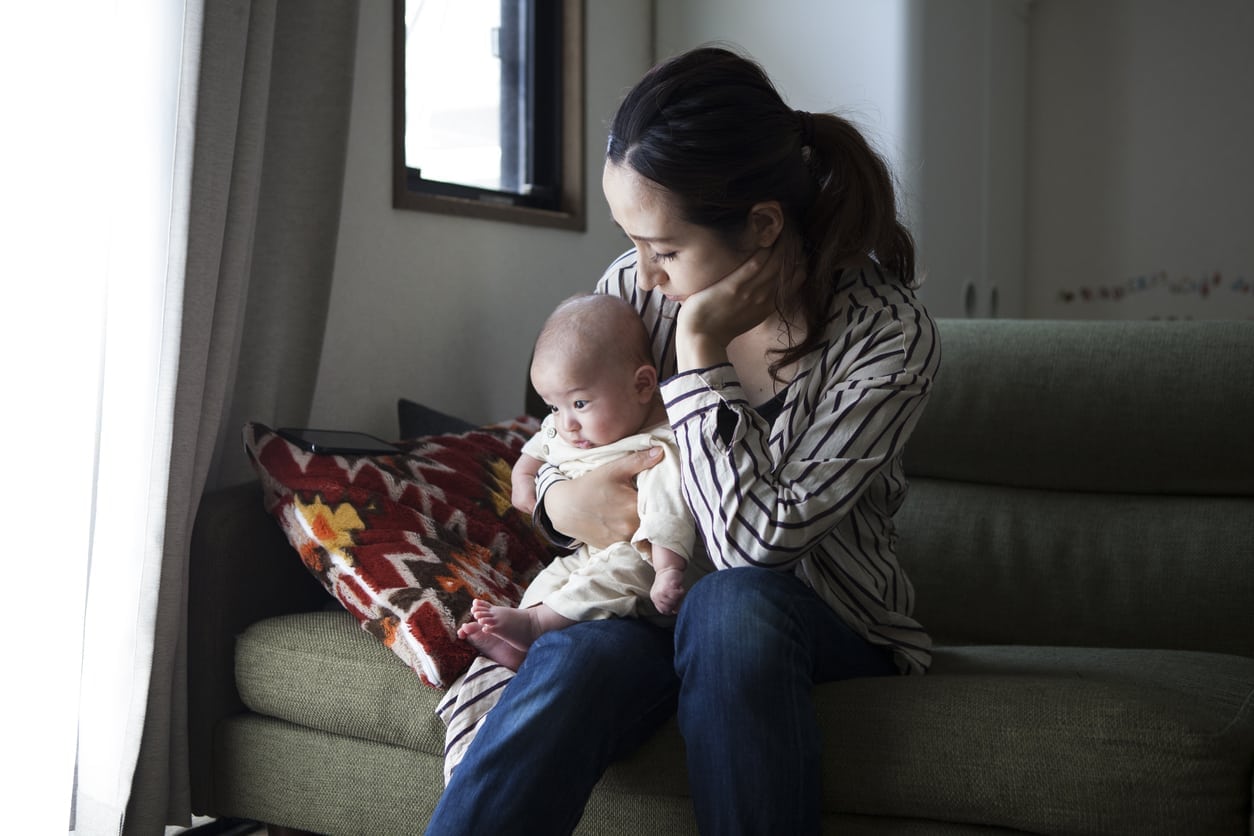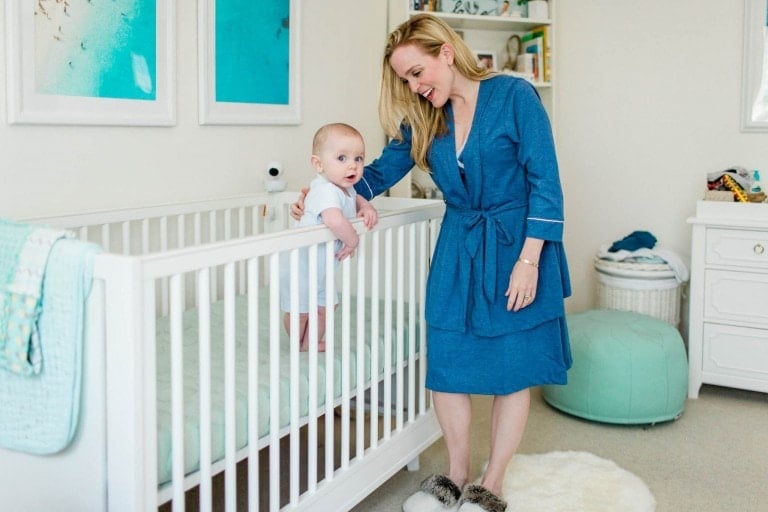Postpartum depression is something that we all tend to hear a lot about, especially if you’ve taken any birthing classes. You and your partner are often aware of it, but what about postpartum anxiety? This is something that can be overlooked in our society.
Postpartum Depression vs. Postpartum Anxiety
I received a questionnaire accessing postpartum depression, the Edinburgh Postnatal Depression Scale (EPDS) for my first postpartum OB check, and several infant checks. It asks if you’ve thought of harming yourself, if you’ve been unhappy, sad, miserable, blaming yourself, and crying for no specific reason. This set of questions is used to measure the presence of depressive symptoms—however, two questions center on feelings of sadness and worry. Although the EPDS is only used to see if depressive symptoms might be present, these two questions about worry might also signal to ask more questions about postpartum anxiety (PPA).
What’s the Difference Between PPD and PPA?
Firstly, PPA is not a diagnosis in the same way PPD is. There is a manual called the Diagnostic and Statistical Manual 5 (DSM-5) with all the names and types of diagnosis, and PPD has its own sub-category under “Depression” (Depressive Disorder with Peripartum Onset). However, PPA has no separate entry in the diagnosis manual. That’s not to say that anxiety pre- or post-having a baby doesn’t occur. It just isn’t as well studied. To diagnose it, you have to meet the same criteria as general anxiety.1
With postpartum depression, you may be feeling overwhelmed, have self-doubt, not feeling a bond with your baby, feel sad, guilty, frustrated, empty, disconnected, hopeless, not sleeping or eating, or have thoughts of suicide. However, you often don’t have these dark and sad emotions come over you with postpartum anxiety, although research does indicate that up to 35% of women will experience both PPD and PPA.2 Instead, you could be bombarded with worry that something horrible will happen (potentially focusing on worries about your baby). Here are some feelings you may have with postpartum anxiety.
Identifying Postpartum Anxiety
First, it’s important to note that many of these symptoms are normal postpartum. You are adjusting to your hormone levels after giving birth, and you might also be sleep-deprived. This is on top of the potential stress of new motherhood and adjustment to a new little person in your life. When these symptoms become excessive or disproportionate to the situation or stop you from engaging in your usual activities, relationships, and roles, it might be time to consult a trusted health professional.3
Constant Worrying
You may experience worry that something terrible will happen. Your baby is napping longer than usual, “Is he breathing?” Your husband typically gets home at 5:00, and it’s 5:15, “Did he get in an accident?” Are the coins in the piggy bank out of reach? Could my baby choke on them? What about the cement floor of the patio? Could they get a concussion if they fell? The mail that sits on the counter could give them a paper cut. The awning could fall and crush them.
Many new parents also worry about the health and well-being of their new baby, but PPA might leave women excessively focused on safety or worried about the health of their child. Nothing has happened, yet the fears can be blown out of control, and the accompanying thoughts are disproportionate to the situation. Fleeting worries are normal and go just as quickly as they have come. But with postpartum anxiety, these questions don’t easily go away and can become intrusive and distressing.
Physical Symptoms
You might also experience physical symptoms of PPA. It’s very normal for mothers to feel tired or have trouble sleeping. However, PPA is not just about parents’ normal (and expected) sleep deficit during their child’s infancy. Often, the chemicals and hormones in the body associated with stress and worry (like cortisol) stop moms from settling or sleeping properly.
Other Symptoms
A full list of symptoms of anxiety include:
- Intrusive or persistent thoughts
- Excessive worry
- Trouble sleeping
- Avoiding things (triggers, situations, people, etc.)
- Feeling tense
- Experiencing a dry mouth
- Nausea
- Irregular heartbeat
- Tiredness and fatigue
- Shakiness or trembling
- Panic attacks
Causes and Risk Factors
Like with other anxiety disorders, there is no apparent cause of PPA. It is thought that some of the natural stressors that occur postpartum might have some influence. Several potential risk factors make some people more likely to develop PPA, including:4
- High-stress levels
- Low social support
- Limited support from significant other/partner
- History of pregnancy loss
- A family history of anxiety disorders
- A history of being diagnosed with either mood or anxiety disorders
- Giving birth to multiple babies
Please note that these are risk factors and not necessarily causes, although having multiple risk factors can potentially influence the likelihood of developing PPA.
What Can Help if You Think You (Or a Loved One) Might Have PPA?
First, nothing you did caused the presence of anxiety. Secondly, giving birth and transitioning to parenthood (whether your first or fifth child) can be challenging. But here are some ways you can cope with PPA:
- Talk it through. Reach out to friends, family, or your partner. Share your worries and fears and actively ask for support. Asking for and accepting help shows strength, not weakness.
- Join a mother’s group or support group for other new parents.
- Try to exercise and move your body (under the guidance of your medical/health professional).
- Have a balanced diet.
- Create a schedule to help bring routine (and a sense of security).
Most importantly, you should acknowledge and access support if your symptoms impact your ability to engage in usual activities/relationships and roles. While it is normal to feel anxiety, do not hesitate to seek support from your trusted healthcare provider to identify available treatments.
Postpartum Anxiety Is Real, and Help Is on the Way
Please seek out help from your doctor. You can go over many options, and having someone to talk to makes it a lot easier. It may be medication or psychiatric support, or it may just be as simple as taking a vacation to relax and take back control of your mind. Our minds are so much more powerful than we know. Instead of allowing fear and anxiety to take control, you need to get yourself to a point where you’re able to take control with strength and that may take time, but please reach out to your significant other and doctor sooner rather than later. You’ve got this, mama!










